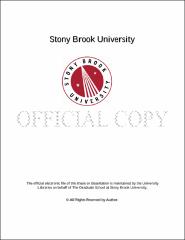| dc.identifier.uri | http://hdl.handle.net/11401/76611 | |
| dc.description.sponsorship | This work is sponsored by the Stony Brook University Graduate School in compliance with the requirements for completion of degree. | en_US |
| dc.format | Monograph | |
| dc.format.medium | Electronic Resource | en_US |
| dc.language.iso | en_US | |
| dc.publisher | The Graduate School, Stony Brook University: Stony Brook, NY. | |
| dc.type | Dissertation | |
| dcterms.abstract | This dissertation develops a phenomenology of events through an application, and critical re-evaluation, of key concepts in the philosophy of Edmund Husserl. I argue that non-phenomenological approaches to events fail to account for the availability of `things that happen' as intentional objects. How are they intelligible as objects of thought and experience? Why is their manner of being `things' one in which they happen (rather than exist, for example)? I argue, moreover, that we can best address these questions through a phenomenological analysis of propositions that express what happens--propositions like `My tooth fell out'--rather than nominal expressions like `earthquake' and `wedding'. With this focus in mind, I turn to Husserl's theory of judgment, which provides a framework with which to approach these propositions, and the intentional objects to which they correspond. Husserl's theory treats judgments as meaning-intentions that are directed towards states of affairs. It includes careful analyses of the `synthetic' cognitive activity through which our pre-predicative experience is objectified, generating a new `thing'--a state of affairs-- which is thereafter available as an object of reference. For Husserl, however, the paradigm of judgment is the copular, property-ascribing judgment `S is p.' I argue that judgments about what happens are unlike property-ascribing judgments, because they are grounded in a different kind of experience. The experience of `happening' is not the experience of `property-having'. To experience happening is rather to intuit the manifestation of force in its effects. Accordingly, the judgments through which we intend and thus objectify the experience of happening--turning it into a `thing'--have (paradigmatically) a different structure than copular property-ascriptions. Rather than ascribe properties to objects, they assign objects to roles in a dynamic structure, in which they participate as e.g. `agents' and `patients' of force. I examine the notion of force mainly in a mechanical context, but argue that it can be usefully expanded to other domains of experience as well. | |
| dcterms.available | 2017-09-20T16:50:48Z | |
| dcterms.contributor | Welton, Donn | en_US |
| dcterms.contributor | Casey, Edward | en_US |
| dcterms.contributor | Grim, Patrick | en_US |
| dcterms.contributor | Drummond, John. | en_US |
| dcterms.creator | Colapinto, Andres | |
| dcterms.dateAccepted | 2017-09-20T16:50:48Z | |
| dcterms.dateSubmitted | 2017-09-20T16:50:48Z | |
| dcterms.description | Department of Philosophy. | en_US |
| dcterms.extent | 214 pg. | en_US |
| dcterms.format | Application/PDF | en_US |
| dcterms.format | Monograph | |
| dcterms.identifier | http://hdl.handle.net/11401/76611 | |
| dcterms.issued | 2013-12-01 | |
| dcterms.language | en_US | |
| dcterms.provenance | Made available in DSpace on 2017-09-20T16:50:48Z (GMT). No. of bitstreams: 1
Colapinto_grad.sunysb_0771E_11431.pdf: 1197323 bytes, checksum: 22e9406218bf64f6481db77bb13c336b (MD5)
Previous issue date: 1 | en |
| dcterms.publisher | The Graduate School, Stony Brook University: Stony Brook, NY. | |
| dcterms.subject | Events, Husserl, Phenomenology | |
| dcterms.subject | Philosophy | |
| dcterms.title | Things that Happen: Husserl's Theory of Judgment and the Problem of Events | |
| dcterms.type | Dissertation | |

